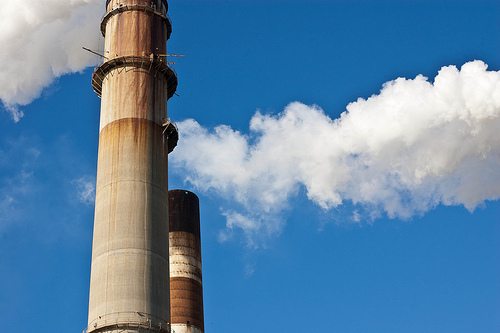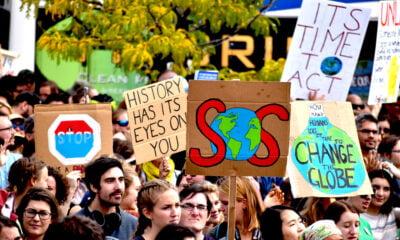

Economy
Munk Debates: is climate change mankind’s defining crisis?
Climate change is mankind’s defining crisis, and demands a commensurate response. This was the motion debated in 2009 by four global warming experts, at an event in Canada run by Munk Debates.
In front of an audience, each speaker was given seven minutes to set out their position on the matter, before they were allowed to rebut and reject claims made by the other side. Event organiser Rudyard Griffiths was tasked with mediating the free-for-all – to often hapless effect.
The first point to make is that although the quartet might be among the most vocal advocates or opponents of climate change, they are by no means the experts (despite being introduced as such by Peter Munk, whose charitable foundation created the debates).
Arguing for acceptance of the motion was Elizabeth May, leader of Canada’s Green Party and a trained lawyer. Guardian writer, environmental activist and Zoology graduate George Monbiot was on her side.
On the opposite bench was Lord Lawson, former chancellor of the exchequer and chairman of the controversial Global Warming Policy Foundation. He has a degree in philosophy, politics and economics from Oxford and was a journalist before becoming a politician. He’s also one of Blue & Green Tomorrow’s four horsemen of the climate apocalypse.
His co-debater was Bjorn Lomborg, a Danish writer who describes global warming as a “joy” and recently claimed in a New York Times column that the developing world needed fossil fuels to survive. His degree is in political science.
May began her introduction by making the above point about herself and her three fellow debaters not being the real experts on climate change. The climate scientists are the experts, she added.
She also pointed towards a 1988 climate change conference in Toronto, which began with the following sentence: “Humanity is conducting an unintended, uncontrolled, globally pervasive experiment whose ultimate consequences could be second only to a global nuclear war.”
Monbiot’s opening remarks began with a question: “How lucky do you feel?” He claimed Lomborg and Lawson were talking about a “better than best-case-scenario” that was more optimistic than even the most optimistic scientific reports.
On the other bench, Lomborg – a self-styled “sceptical environmentalist” – described how poverty, providing access to clean energy and the need to rid the world of infectious diseases were more pressing issues than climate change.
Meanwhile, Lawson claimed there had been “no further global warming this century” – a point that Mobiot and May rebutted later on.
Prior to the debate, the audience voted on which side of the fence they sat, with 61% saying that climate change is indeed mankind’s defining crisis. But post-debate results suggested a win for Lomborg and Lawson, with the climate advocates’ advantage falling to 53%.
We can only hypothesise whether Lomborg’s concluding attempt to overtly pull at the audience’s heartstrings – “What is more important: to save 4.5 million kids or postponing global warming six hours?” – was a factor in this shift.
What the public results tell us, though, is how good at debating the four were, and definitely not the extent to which the science on the matter is settled.
We know that the overwhelming majority of climate scientists agree that climate change is primarily driven by human-produced carbon dioxide. James Lawrence Powell’s excellent analysis last year of 13,950 peer-reviewed climate articles from between 1991 and 2012 found that only 24 either rejected this claim or suggested the world wasn’t warming at all. That’s 0.17%, or one in 581.
There is an argument that says some of the greatest scientific discoveries have been made by out-of-consensus scientists: think Newton and gravity; Einstein and the theory of relativity. Indeed, we champion such innovation on a daily basis.
But when it comes to climate change, it doesn’t quite work like that – plainly because of the lack of disproving evidence offered by naysayers. Even when evidence is thrust forward that rejects global warming, authors often (nine out of 10 times, according to Carbon Brief) have strong links to oil companies (i.e. the firms with a vested interest in climate change not existing).
In the same way that atheists would be regarded as foolish for not believing in God if Jesus Christ himself came down from Heaven tomorrow, climate scientists would instantly change their opinion if a credible stream of peer-reviewed research was tabled.
This is the nature of science. It shifts with consensus.
And with the scientific consensus as it is, these kind of public debates don’t help in enacting critical policy decisions over carbon emissions or renewable energy. Instead, they give influential platforms to dangerous views; while making the debate appear balanced and the science unsettled.
As the Telegraph’s Tom Chivers wrote in response to the BBC’s decision not to give equal air time to both sides of the climate debate, “The BBC isn’t ‘balanced’ in its reporting of climate change: but the facts aren’t ‘balanced’ either”.
Lord Lawson, of all people, makes a good point in his concluding address when he says that politicians are full of bold rhetoric on climate change, but lacking in action: “politicians talk big, but do very little.” He attributes this to the cost of adopting carbon reduction measures.
However, the real reason for this gulf between talking and walking is to do with the politicians themselves.
George Osborne, the man in charge of distributing the UK’s annual budget, once described green campaigners as the “environmental Taliban” and has been called “seriously misinformed” on sustainable business by former US vice president Al Gore.
He appears to have an ideological objection to renewable energy, which given he is among the most powerful British politicians (of which there are a few anti-greens), is worrying.
In the Munk Debate on climate change, Lawson and Lomborg (in particular) set up numerous straw man arguments, claiming that there is a choice to be made between tackling poverty and fighting climate change. May and Monbiot respond by explaining how climate change will inflate the risk of infectious diseases, push more people into poverty and increase the number of natural disasters.
All the evidence from every respectable scientific body suggests they are right. These are the experts. We should listen to them. Not to do so would be effectively signing the human race’s death sentence.
Climate change is mankind’s defining crisis, and it does demand a commensurate response To quote Monbiot, how lucky do you feel?
Click here to watch the debate for yourself.
Further reading:
97% of scientists agree that climate change is human-caused
Climate sceptics are our generation’s slavery apologists
Why climate deniers have no scientific credibility – in one pie chart
How online ‘filter bubbles’ can reinforce climate scepticism
Visual evidence, not science, shown to sway climate sceptics


 Environment12 months ago
Environment12 months agoAre Polymer Banknotes: an Eco-Friendly Trend or a Groundswell?

 Features11 months ago
Features11 months agoEco-Friendly Cryptocurrencies: Sustainable Investment Choices

 Features12 months ago
Features12 months agoEco-Friendly Crypto Traders Must Find the Right Exchange

 Energy11 months ago
Energy11 months agoThe Growing Role of Solar Panels in Ireland’s Energy Future





























